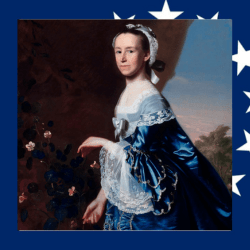
Mercy Otis Warren was a leading political and literary figure during the American Revolution. Known as the “Conscience of the American Revolution,” Mercy became an outspoken figure for women’s access to educational opportunities, and she was also known for her opposition to British policies. Born on September 14, 1728 in Barnstable, Massachusetts as one of thirteen children, she became involved in politics from an early age. Even though Mercy did not have the opportunity for a formal education, she immersed herself in her brother’s history and political education. Her early interest in politics and history led her to disapproval of British control. She even opposed the Constitution as a Jeffersonian Republican later in her life; she believed in a natural rights philosophy.
Her writing career began when she married James Warren in 1754–he would go on to serve in the Massachusetts legislature in 1766. Her political interests came not only from her childhood but soon her husband as well. She wrote to men such as John Adams discussing the newly founded republic. Mercy was not always opposed to the British, but as multiple acts were passed, including the Sugar Act (1764), the Stamp Act (1765), and Townshend Duties Act (1767), Mercy believed peace could not be achieved. The British troops’ arrival in Boston in October 1786 sealed this belief for Mercy.
Most notably, Mercy first wrote political plays that criticized British policies and imperialism. Mercy was also against the policies of Massachusetts Governor Thomas Hutchinson. Three of her most famous plays included “The Adulator” published in 1772 in the Massachusetts Spy, Defeat in 1773, and The Group in 1775. Not only did Mercy write about her opposition against the British, she also encouraged women of her day to oppose the British as well through participation in the Boston Tea Party. Her work also included two dramas, The Blockheads in 1776 and The Motley Assembly in 1779. Much of her work was published anonymously, as she criticized the British and the people of Boston for supporting the British. Mercy was not only a poet and political playwright, she also was a historian, writing the history of the American Revolution. She wrote to John Adams, Thomas Jefferson, and George Washington. As a woman with no opportunity for formal education, it was unheard of for women to hold these political and literary roles. After the American Revolution, Mercy continued writing. In 1805, Mercy published History as the Rise, Progress and Termination of the American Revolution. Mercy’s work was remarkable. She was one of the first women to publish a nonfiction book in the new republic and the third woman to publish a poetry book—Poems, Dramatic and Miscellaneous—experiences of the war. Mercy never gave up on her writing and wrote until the end of her life in 1814.
